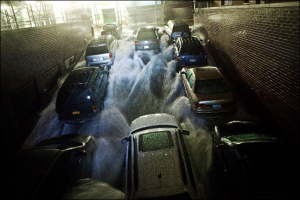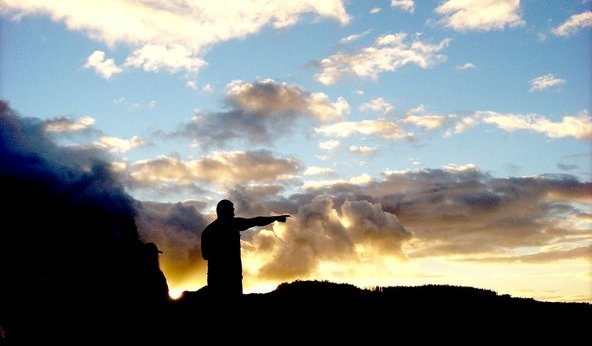Forecasts about the inevitability of catastrophic climate change at the hands of man, and social upheaval stemming from it, are becoming commonplace. Look behind the big science and small talk about the weather however, and the real message is pessimism about the human prospect.
 The most raw, revealing and disturbing example I’ve read of widespread surrender to the bleakness of man-made tides comes in the form of an essay entitled, “Learning How to Die in the Anthropocene,” by Roy Scranton. It’s a veritable manifesto for quitters on humanity.
The most raw, revealing and disturbing example I’ve read of widespread surrender to the bleakness of man-made tides comes in the form of an essay entitled, “Learning How to Die in the Anthropocene,” by Roy Scranton. It’s a veritable manifesto for quitters on humanity.
“Extreme weather events (floods, droughts, heat waves) will increasingly disrupt food and energy markets, exacerbating state weakness, forcing human migrations, and triggering riots, civil disobedience, and vandalism,” Scranton pronounces like an Old Testament prophet—minus the possibility of renewal and redemption.
With no philosophical (much less spiritual and metaphysical) depth, the author, an Iraq war veteran, writes with the trepidation of despair: “The biggest problem we face is a philosophical one: understanding that this civilization is already dead…and there’s nothing we can do to save ourselves.”
“We have passed the point of no return.” Has this soldier’s brush with death given him omniscience?
“What does one life mean in the face of species death or the collapse of global civilization? How do we make meaningful choices in the shadow of our inevitable end?” Hold on there Roy, the fat lady hasn’t sung on humanity yet.
What Stanton evokes in his essay, with vivid details from the American-initiated carnage and chaos in Iraq, is a self-induced deadening of the heart and spirit seen in many Americans, without the excuse of experiencing the hellishness of Iraq. It attests to the truth that the misery America loosed in that land has come back to bite us in the ass in the homeland.
A contagion of the spirit, sustained by fixed ideas about the immutable selfishness of human nature, has spread like a pandemic throughout the Western world since the start this vile “war of choice.” And though America has withdrawn from the war and the world, the carnage continues in Iraq and the region.
Written by one of America’s Iraq heroes, Scranton’s essay is the best evidence to date of the metaphysical missions from hell of George Bush Senior and Junior. George Senior provided the straw that broke the American spirit with Gulf War I; Junior provided a bale to break the human spirit with Gulf War II. But it’s up to each one of us whether it will succeed.
“Every day I went out on a mission in Iraq, I looked down the barrel of the future and saw a dark, empty hole,” Scranton declares with both pathos and pathology. He doesn’t realize that that’s exactly what he was supposed to see and feel, what all of us are supposed to see and feel, so that we’ll give up on humanity.
The name for such a philosophical stance is nihilism, and it has become the common currency of many outwardly informed and inwardly unaware people in the West.
Scranton goes on to distort and camouflage the age-old insight, that learning how to live is the art of learning how to die, into fatalism and resignation. “I got through my tour in Iraq one day at a time, meditating each morning on my inevitable end,” he writes. What does he mean by ‘meditating?’
“Every morning, after doing maintenance on my Humvee, I’d imagine getting blown up by an I.E.D., shot by a sniper, burned to death, run over by a tank, torn apart by dogs, captured and beheaded, and succumbing to dysentery. Then, before we rolled out through the gate, I’d tell myself that I didn’t need to worry, because I was already dead.”
run over by a tank, torn apart by dogs, captured and beheaded, and succumbing to dysentery. Then, before we rolled out through the gate, I’d tell myself that I didn’t need to worry, because I was already dead.”
Imagining oneself being blown up isn’t meditating; it’s killing feeling in order to overcome fear. Meditation means undividedly observing what’s outside and inside with tremendous sensitivity, heightening the senses and one’s capacity to feel to their fullest extent.
Obviously, that would have been nearly impossible to do in Iraq. But numbing out to get through the day, whether through alcohol, drugs, or by some self-hypnotic trick of the mind, is utterly the wrong way to go.
Extolling his confusion as clarity, Scranton goes on to quote from an 18th-century Samurai manual “Hagakure,” which he says helped him immensely in Iraq: “Meditation on inevitable death should be performed daily.”
Communing with death has nothing to do with thinking about one’s inevitable end, much less imagining oneself “getting blown up by an I.E.D.” That shows a total misunderstanding of meditation and death. Deadness is not death, and death is not deadness.
The actuality of death surrounds and is within us every moment. To come into direct contact with its cleansing and renewing actuality, we have to die to everything, which means taking the time and making the space to be aware of every thought and emotion as they arise, and letting them pass without judgment or interference until one is nothing. Then the otherness may come.
In short, when thought stops, time ends; when time ends, death is; when death is, creation and love are. That’s what meditation on death means, thereby “freeing ourselves to deal with whatever problems the present offers without attachment or fear.”
Scranton is correct in saying “the reality of global climate change is going to keep intruding on our fantasies of perpetual growth, permanent innovation and endless energy, just as the reality of mortality shocks our casual faith in permanence.”
But he sets up a false choice, between denial (“continue acting as if tomorrow will be just like yesterday”) and numbing out (“I don’t need to worry, because I’m already dead’). Indeed, they amount to the same thing.
Scranton is also correct in saying: “The biggest problems the Anthropocene poses are precisely those that have always been at the root of humanistic and philosophical questioning: ‘what does it mean to be human?’ and, ‘what does it mean to live?”’
His prescription is for deadness however, not for making a friend of death. There is no change in the former, for the human or the human species.
But there is an unending journey of learning and transmutation in the latter. And there is great urgency for radical change, for it has become a matter of inward and outward survival.
Martin LeFevre
“Learning How to Die in the Anthropocene”: http://opinionator.blogs.nytimes.com/2013/11/10/learning-how-to-die-in-the-anthropocene/

